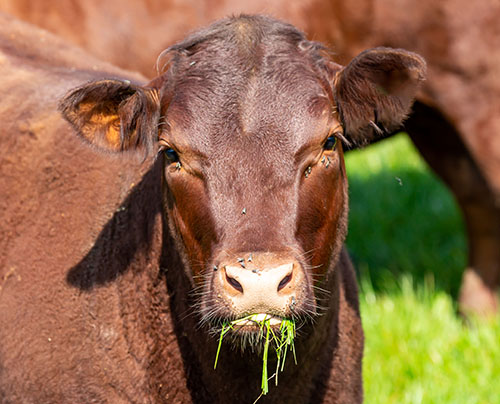Grass tetany in Cattle
Feb 06, 2023

Dr. Kevin Cox, DVM, CEO Alliance Animal Care
In the minds of cattlemen, spring always brings the fear of grass tetany. Grass tetany is a metabolic disorder caused by a deficiency of magnesium. Many processes in the body need magnesium, and neurologic processes depend on it greatly. The cow is very inefficient in storing magnesium in a readily accessible place; therefore, sufficient consumption of magnesium is imperative for the cow to function normally. Springtime, especially, is problematic as many forages are deficient in this mineral.
Symptoms of a magnesium deficiency are numerous and relatively easy to recognize. However, this disorder is a very rapidly progressing one, and sometimes cattle die before the farmer has an opportunity to notice that there is anything wrong. Many cases of grass tetany are diagnosed “after the fact” when a cow is found dead in the pasture and the grass around the animal shows signs of a struggle but no signs of trauma. This disorder affects primarily middle- to older-aged cattle who are nursing a calf that is two months old or less. Surprisingly, this is one disorder that heifers are rarely affected by, and it is rarely seen in bulls.
Some of the very first symptoms of grass tetany in cattle are related to behavior. Increased excitability and aggressive behavior are two of the first signs that are exhibited by affected cows. However, these symptoms often go unnoticed as they last a short period of time and may not be noticeable when producers are checking cattle. Anorexia and isolation are more noticeable as they may occur over longer periods of time. Very shortly, the cow will begin to exhibit signs of muscle spasms, odd gaits, ataxia, and recumbency. Once these symptoms occur, the cow is in a very dangerous state. As stated earlier, this disorder progresses quickly and treatment needs to occur right away.
Treatment is most effectively done by a veterinarian. Intravenous magnesium is usually given to the cow in an attempt to save her life, but even then, some cases have a very guarded prognosis if they are well-advanced in the stages of the disorder. Relapses are also common in cases of grass tetany, so prevention is key.
High magnesium minerals are strongly recommended to avoid this costly (and often deadly) disorder. Ask your local Co-op personnel about any questions regarding grass tetany, its treatment, or prevention.
For more content like this, check out the latest issue of The Cooperator.
In the minds of cattlemen, spring always brings the fear of grass tetany. Grass tetany is a metabolic disorder caused by a deficiency of magnesium. Many processes in the body need magnesium, and neurologic processes depend on it greatly. The cow is very inefficient in storing magnesium in a readily accessible place; therefore, sufficient consumption of magnesium is imperative for the cow to function normally. Springtime, especially, is problematic as many forages are deficient in this mineral.
Symptoms of a magnesium deficiency are numerous and relatively easy to recognize. However, this disorder is a very rapidly progressing one, and sometimes cattle die before the farmer has an opportunity to notice that there is anything wrong. Many cases of grass tetany are diagnosed “after the fact” when a cow is found dead in the pasture and the grass around the animal shows signs of a struggle but no signs of trauma. This disorder affects primarily middle- to older-aged cattle who are nursing a calf that is two months old or less. Surprisingly, this is one disorder that heifers are rarely affected by, and it is rarely seen in bulls.
Some of the very first symptoms of grass tetany in cattle are related to behavior. Increased excitability and aggressive behavior are two of the first signs that are exhibited by affected cows. However, these symptoms often go unnoticed as they last a short period of time and may not be noticeable when producers are checking cattle. Anorexia and isolation are more noticeable as they may occur over longer periods of time. Very shortly, the cow will begin to exhibit signs of muscle spasms, odd gaits, ataxia, and recumbency. Once these symptoms occur, the cow is in a very dangerous state. As stated earlier, this disorder progresses quickly and treatment needs to occur right away.
Treatment is most effectively done by a veterinarian. Intravenous magnesium is usually given to the cow in an attempt to save her life, but even then, some cases have a very guarded prognosis if they are well-advanced in the stages of the disorder. Relapses are also common in cases of grass tetany, so prevention is key.
High magnesium minerals are strongly recommended to avoid this costly (and often deadly) disorder. Ask your local Co-op personnel about any questions regarding grass tetany, its treatment, or prevention.
For more content like this, check out the latest issue of The Cooperator.